The issue of carbon in the atmosphere as a major driver of climate change has prompted researchers from McGill University to develop a groundbreaking catalyst for converting carbon dioxide (CO2) into methane using copper nanoclusters. This new method offers a cleaner source of energy and has the potential to significantly impact the fight against climate change.
The Potential of Electrocatalysis
Unlike traditional methods of producing methane from fossil fuels, which contribute to more CO2 emissions, electrocatalysis offers a more sustainable alternative. By utilizing renewable sources of energy such as solar power and wind, the process of converting CO2 into methane allows for the storage of energy in chemical form. This innovative approach could pave the way for a closed “carbon loop” that prevents the release of new carbon dioxide into the atmosphere.
Mahdi Salehi, a Ph.D. candidate at the Electrocatalysis Lab at McGill University, highlights the significance of copper nanoclusters in the transformation of carbon dioxide into methane. Through their research, the team discovered that extremely small copper nanoclusters are highly effective in producing methane. This breakthrough emphasizes the importance of the size and structure of the nanoclusters in driving the reaction towards a favorable outcome.
The Research Findings
The study, recently published in the journal Applied Catalysis B: Environment and Energy, was made possible by the Canadian Light Source (CLS) at the University of Saskatchewan. Salehi and his team conducted simulations using copper catalysts of varying sizes and subsequently tested them in the lab to analyze their impact on the reaction mechanism. The results underscored the efficacy of small copper nanoclusters in methane production, marking a significant step forward in the quest for sustainable energy solutions.
Moving forward, the researchers aim to further enhance their catalyst to improve its efficiency and explore its potential for large-scale industrial applications. By building on their initial findings, they hope to unlock new opportunities for the production of clean, sustainable energy. Through continued innovation and experimentation, the team at McGill University is paving the way for a greener and more environmentally-conscious future.



Leave a Reply